“Hi Carmen, I was wondering if you would like to come down earlier before your consultation? Perhaps we could go for lunch?”
My already furiously beating heart raced even faster and I could feel my stomach turn itself inside out as I clutched tightly to my phone. After I hung up the call, the friend whom I was lunching with asked concernedly, “Are you alright? You’ve gone pale, is this some guy you’re trying to reject?”
But this wasn’t just any guy, this was my professor. The circumstances I found myself in with my professor felt like a Korean drama, except that I did not enjoy it one bit. It started out with an innocent mistake in my first semester of university – he had called my name wrongly in class and I had corrected him sarcastically.
The circumstances I found myself in with my professor felt like a Korean drama, except that I did not enjoy it one bit. It started out with an innocent mistake in my first semester of university – he had called my name wrongly in class and I had corrected him sarcastically.
From then on, he paid special attention to me, whether in class or out of class. He would greet me in every lecture and tutorial, he complimented my appearance, and occasionally made inappropriate comments about me in class.
I was 18, with zero experience and expectations in the relationships arena, so to have a slightly older, intelligent and articulate man give me so much attention made me freak out.
I spent the next 2 years of my university life avoiding anything related to him, even taking detours in my route so that I wouldn’t have to walk past the building his office was housed in.
In hindsight, it does seem silly of me to have panicked to such an extent. My conscience was clear, and it was (and is) after all, an offence in the university’s code of conduct for professors and students to have romantic relationships with each other.
Whilst I remain unclear of his intentions till today, I realised that I needed to relook the way I perceived and maintained boundaries with the other gender, even if they were older and in positions of authority. Here are 3 thoughts I have on responding to ambiguous attention.
3 WAYS TO DRAW BOUNDARIES
1. Check your heart
Even as I was careful that my responses to my professor’s actions did not disrespect his position of authority over me or encourage him further, I needed to search my heart and be very clear of my feelings and intentions surrounding the situation.
There was a pressing need for me to distinguish between feeling truly uncomfortable and the unfamiliarity of feeling flattered from the attention he paid me. I grew up without the presence of a father and was thus not comfortable with older men in positions of authority.
These emotions are, of course, not mutually exclusive, but there was a need to discern and possibly, admit to them before they misled me any further.
“The heart is deceitful above all things and beyond cure. Who can understand it?” (Jeremiah 17:9)
Once I was clear about the distinctions, it helped me take captive of my thoughts: Did I really dread having to go to class or was I secretly anticipating his interactions with me?
While I was very clear that I did not want a romantic relationship with him, I needed to be as clear that I was not attracted to him. He was after all, still very much an eligible bachelor.
Being clear of my emotions set a healthy standard for the types of actions and responses I had towards my professor, and could also hold towards my interactions with other guys.
2. Clarify, if not, seek help
Clarifying anything ambiguous in relationships of any kind is always the best move. But honestly, I lacked the guts to approach my professor to do just that. But if you have the courage to speak politely but firmly with the other party, it would definitely be beneficial for both of you.
I am thankful for a group of friends, both girls and guys, Christians and non-believers, whom I could confide in and give me perspective on my situation. Some of them even walked me to classes or consultations I had with him (and waited for me) just so that I had someone who could help me if needed and keep me accountable.
However, if the situation is highly uncomfortable and have no other means of assistance, you can approach your school’s student welfare office. They do take such cases seriously and will ensure that your identity is protected in the process.
3. Protecting your heart
Checking my heart earlier helped me protect myself emotionally in that season. It was also a catalyst for me to begin considering and noting the qualities I would like in my future spouse so that until I met him, I could protect my heart and purity.
(I think you start knowing what you want when you know what you don’t want!)
Beyond surrendering that list of qualities I had drawn up to God, more importantly, I had to surrender my heart to Him as well and it allowed me to experience Him as my heavenly Father as well.
Protecting my heart allowed nothing to take the centre position He had in my life, even if it was a momentary attraction. I eventually bumped into my professor in my third year of university, and I’m thankful that we received each other with warmth and courtesy. The peace I felt while speaking to him informed me of my own emotional growth.
I eventually bumped into my professor in my third year of university, and I’m thankful that we received each other with warmth and courtesy. The peace I felt while speaking to him informed me of my own emotional growth.
This reassured me that my heart was the safest in the hands of its Creator, and I was allowing myself to be moulded such that I would eventually be ready – both spiritually and emotionally – to one day be in a committed relationship with the man He has set aside for me.
The author’s name has been changed for confidentiality.









